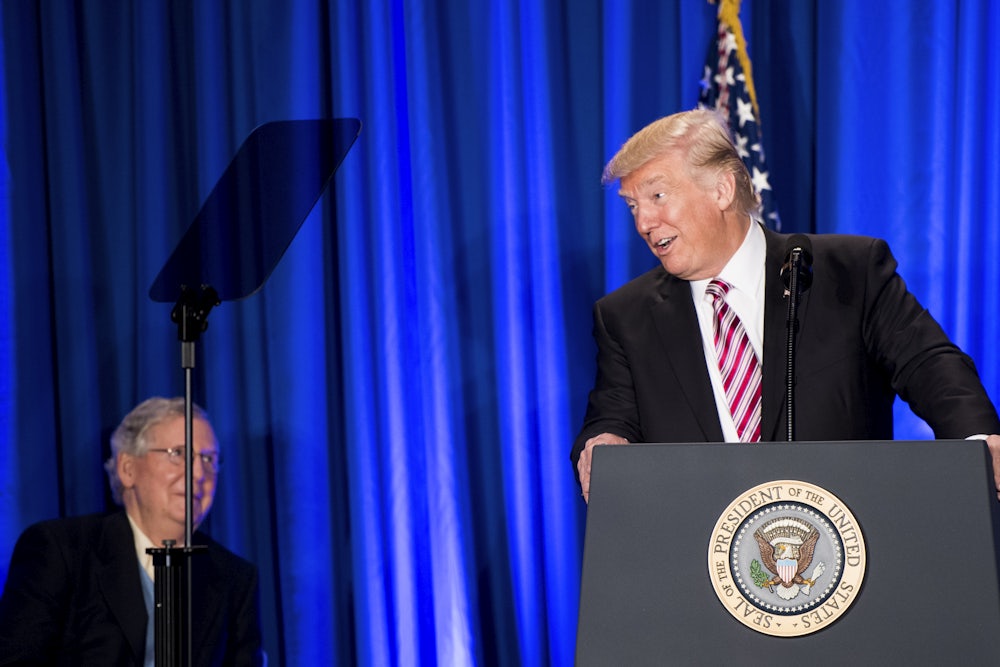President Donald Trump’s first big betrayal of his supporters this week was his acknowledgement on Wednesday that American taxpayers will pay for the construction of his proposed border wall with Mexico. Trump, who has long insisted that Mexico would pay for it, claimed that we’ll be “reimbursed” by our neighbor to the south—despite the nation’s repeated insistence that this folly. How would that work? On Thursday, White House Press Secretary Sean Spicer said “the plan that’s taking shape now” includes a 20 percent tax on all imports from Mexico to the United States, the cost of which would almost certainly be passed onto consumers.
The White House is now walking back this idea, saying it’s just one of many that are under consideration to finance Trump’s signature campaign promise—a “buffet of options,” in the words of Chief of Staff Reince Priebus. But it’s just the latest evidence of how Trump’s policies could end up hurting the very “forgotten men and women of our country” he promised to champion. Working-class Americans, including the white working-class voters who were vital to Trump’s victory over Hillary Clinton, would be hammered by the policies he’s poised to implement. And they also won’t benefit from the many ways Trump is already looking out for the country’s elite citizens and corporations.
When Spicer floated the 20 percent tax on Thursday, the bipartisan backlash was swift and decisive. Here we have a liberal economist, a left-leaning economic reporter, a conservative editor, an ex-congressman Tea Partier, and a Republican senator, respectively:
Tariffs aren't paid by the exporter; it depends a bit on the details, but it's basically a tax on domestic consumers 6/
— Paul Krugman (@paulkrugman) January 26, 2017
Alternative headline: Trump floats arcane way to tax American consumers for border wall, slowing Mexican and American economies by the by.
— Annie Lowrey (@AnnieLowrey) January 26, 2017
So, the wall will be paid for first by American taxpayers, and then American consumers will bear the additional costs of Trump's rage
— Noah Rothman (@NoahCRothman) January 26, 2017
No @seanspicer. A 20% tax on Mexican imports to pay for the wall means American consumers will pay for the wall.https://t.co/vttCllOl1b
— Joe Walsh (@WalshFreedom) January 26, 2017
Simply put, any policy proposal which drives up costs of Corona, tequila, or margaritas is a big-time bad idea. Mucho Sad. (2)
— Lindsey Graham (@LindseyGrahamSC) January 26, 2017
It’s not just drinks, either. Economics experts across the ideological spectrum said the cost of many goods—some that Americans might not even realize come from Mexico—would be passed on to consumers, and that it could be a significant hit.
“If you tax exports from Mexico into the United States, you’re going to make things ranging from avocados to appliances to flat-screen TVs, you’re going to make them more expensive,” Mexican Foreign Minister Luis Videgaray said at the Mexican Embassy in Washington Thursday night, according to Reuters.
“Mexico is the United States’ third-largest supplier of imports—chiefly vehicles, electrical machinery, mineral fuels and agricultural products,” The Los Angeles Times reported, while USA Today reported that “American consumers may have to pay more for products ranging from Toyotas to vegetables.” Tom Stenzel, president and CEO of the United Fresh Produce Association, said in a statement to the newspaper: “Consider the impact on American consumers of a 20% hike in the cost of foods such as bananas, mangoes and other products that we simply cannot grow in the United States.”
Even if Trump doesn’t go through with this import tax—and Spicer did say that Trump eventually wants to apply the 20 percent tax to all countries—many of his other policies are shaping up to hurt his white-working class constituency.
Of these, repealing the Affordable Care Act would be the most damaging. “Economic analyses of some of the leading plans, particularly those from House leadership and the Senate Finance Committee, all suggest that millions fewer would have coverage,” Vox’s Sarah Kliff reported Thursday. Even a new, apparently better plan from Republican Senators Bill Cassidy and Susan Collins “envisions enrolling people into bare-bones catastrophic plans” and “wouldn’t have the same benefit mandates the health care law currently sets,” she wrote. The Atlantic’s Ron Brownstein thinks blue-collar white Americans might abandon their longstanding opposition to Obamacare if its benefits are actually going to be taken away from them.
The hope is that some of these Americans—starting with those who supported President Barack Obama but didn’t back Clinton—will also change their mind about Trump. They’ll realize that, as Vox put it the morning after his election, “Donald Trump’s presidency is going to be a disaster for the white working class.” Beyond higher consumer prices and increased healthcare costs, these Americans are likely to see little benefit from tax cuts in House Speaker Paul Ryan’s budget, while the rich would reap a windfall. Trump is even taking credit for stock market gains, though he has little do with it, and even here, blue-collar Americans without significant investments or robust retirement savings aren’t the primary beneficiaries.
Trump’s economic pitch to working class is that he will create jobs: On the campaign trail, he claimed he would be the “greatest job producer God has ever created.” But a major tax on imports would likely do the opposite. Some six million U.S. jobs rely on trade with Mexico, according to the U.S. Chamber of Commerce. “Experts say those jobs would be jeopardized if Trump restricts trade with Mexico,” CNN Money reports. “Higher prices on some products mean that Americans would have less money to spend on others. That would end up costing jobs.”
Trump wouldn’t be the first Republican president to enact policies that hurt the economic livelihood of the very voters he rode to office, but he may well be the most egregious example yet. It took him only a week to forget the “forgotten” Americans.
